中英谚语
- 格式:doc
- 大小:32.50 KB
- 文档页数:4
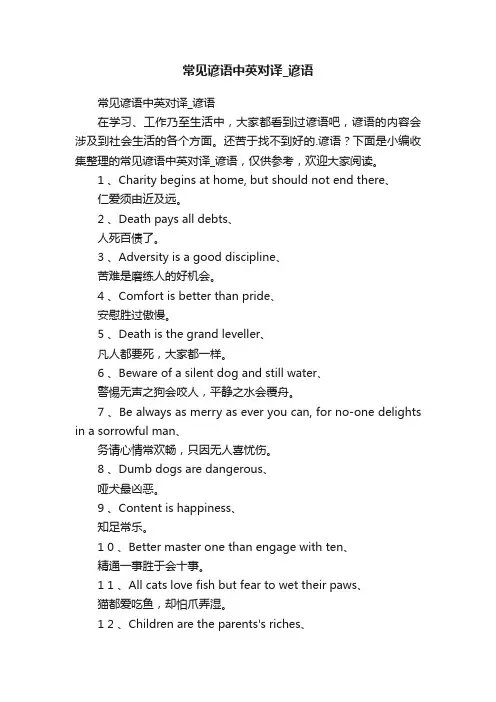
常见谚语中英对译_谚语常见谚语中英对译_谚语在学习、工作乃至生活中,大家都看到过谚语吧,谚语的内容会涉及到社会生活的各个方面。
还苦于找不到好的.谚语?下面是小编收集整理的常见谚语中英对译_谚语,仅供参考,欢迎大家阅读。
1 、Charity begins at home, but should not end there、仁爱须由近及远。
2 、Death pays all debts、人死百债了。
3 、Adversity is a good discipline、苦难是磨练人的好机会。
4 、Comfort is better than pride、安慰胜过傲慢。
5 、Death is the grand leveller、凡人都要死,大家都一样。
6 、Beware of a silent dog and still water、警惕无声之狗会咬人,平静之水会覆舟。
7 、Be always as merry as ever you can, for no-one delights in a sorrowful man、务请心情常欢畅,只因无人喜忧伤。
8 、Dumb dogs are dangerous、哑犬最凶恶。
9 、Content is happiness、知足常乐。
1 0 、Better master one than engage with ten、精通一事胜于会十事。
1 1 、All cats love fish but fear to wet their paws、猫都爱吃鱼,却怕爪弄湿。
1 2 、Children are the parents's riches、子女是父母之财富。
1 3 、A man can do no more than he can、凡事只能量力而行。
1 4 、A good name keeps lustre in the dark、好的名声在黑暗中也会光芒四射。
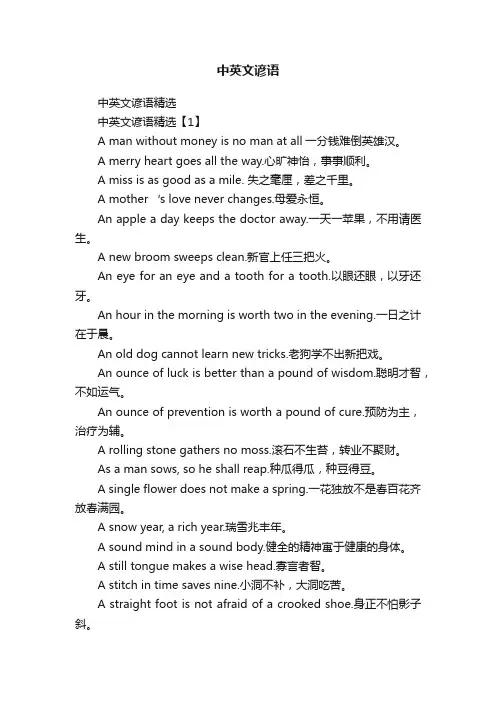
中英文谚语中英文谚语精选中英文谚语精选【1】A man without money is no man at all一分钱难倒英雄汉。
A merry heart goes all the way.心旷神怡,事事顺利。
A miss is as good as a mile. 失之毫厘,差之千里。
A mother‘s love never changes.母爱永恒。
An apple a day keeps the doctor away.一天一苹果,不用请医生。
A new broom sweeps clean.新官上任三把火。
An eye for an eye and a tooth for a tooth.以眼还眼,以牙还牙。
An hour in the morning is worth two in the evening.一日之计在于晨。
An old dog cannot learn new tricks.老狗学不出新把戏。
An ounce of luck is better than a pound of wisdom.聪明才智,不如运气。
An ounce of prevention is worth a pound of cure.预防为主,治疗为辅。
A rolling stone gathers no moss.滚石不生苔,转业不聚财。
As a man sows, so he shall reap.种瓜得瓜,种豆得豆。
A single flower does not make a spring.一花独放不是春百花齐放春满园。
A snow year, a rich year.瑞雪兆丰年。
A sound mind in a sound body.健全的精神寓于健康的身体。
A still tongue makes a wise head.寡言者智。
A stitch in time saves nine.小洞不补,大洞吃苦。
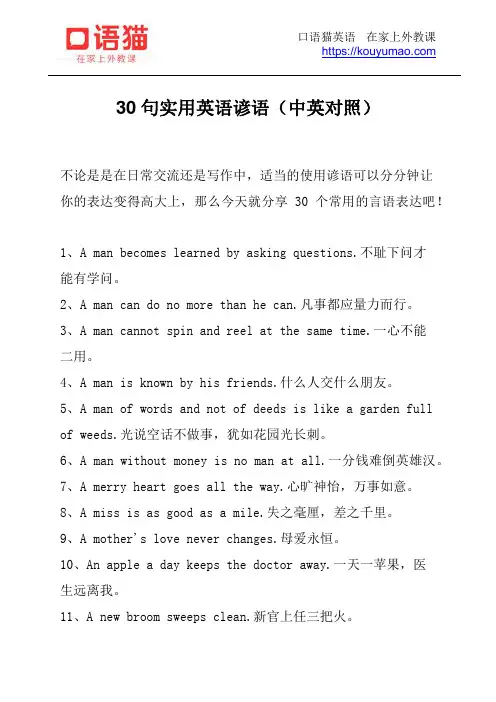
30句实用英语谚语(中英对照)不论是是在日常交流还是写作中,适当的使用谚语可以分分钟让你的表达变得高大上,那么今天就分享30个常用的言语表达吧!1、A man becomes learned by asking questions.不耻下问才能有学问。
2、A man can do no more than he can.凡事都应量力而行。
3、A man cannot spin and reel at the same time.一心不能二用。
4、A man is known by his friends.什么人交什么朋友。
5、A man of words and not of deeds is like a garden full of weeds.光说空话不做事,犹如花园光长刺。
6、A man without money is no man at all.一分钱难倒英雄汉。
7、A merry heart goes all the way.心旷神怡,万事如意。
8、A miss is as good as a mile.失之毫厘,差之千里。
9、A mother's love never changes.母爱永恒。
10、An apple a day keeps the doctor away.一天一苹果,医生远离我。
11、A new broom sweeps clean.新官上任三把火。
12、An eye for an eye and a tooth for a tooth.以眼还眼,以牙还牙。
13、An hour in the morning is worth two in the evening.一日之计在于晨。
14、An old dog cannot learn new tricks.老狗学不出新把戏。
15、An ounce of luck is better than a pound of wisdom.聪明才智,不如运气。
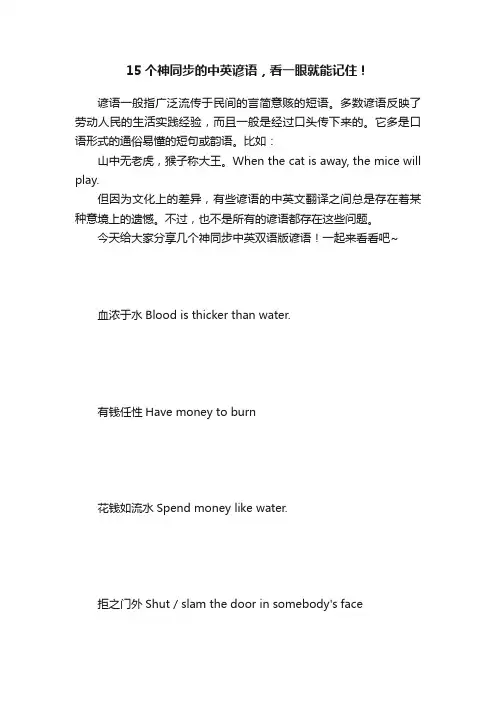
15个神同步的中英谚语,看一眼就能记住!谚语一般指广泛流传于民间的言简意赅的短语。
多数谚语反映了劳动人民的生活实践经验,而且一般是经过口头传下来的。
它多是口语形式的通俗易懂的短句或韵语。
比如:山中无老虎,猴子称大王。
When the cat is away, the mice will play.但因为文化上的差异,有些谚语的中英文翻译之间总是存在着某种意境上的遗憾。
不过,也不是所有的谚语都存在这些问题。
今天给大家分享几个神同步中英双语版谚语!一起来看看吧~血浓于水Blood is thicker than water.有钱任性Have money to burn花钱如流水Spend money like water.拒之门外Shut / slam the door in somebody's face隔墙有耳Walls have ears.三个臭皮匠赛过诸葛亮Two heads are better than one 绞尽脑汁Rack your brain(s)光阴一去不复返No one can call back yesterday.没有不带刺的玫瑰No rose without a thorn有钱能使鬼推磨Money talks没金钱,就没爱情No money, no honey相思病无药可治No herb will cure love夜莺困笼不唱歌Nightingales will not sing in a cage 不劳不获No pain, no gain得寸进尺Give inch and they'll run a mile你还知道哪些神同步的中英谚语?来留言区分享一下吧!。
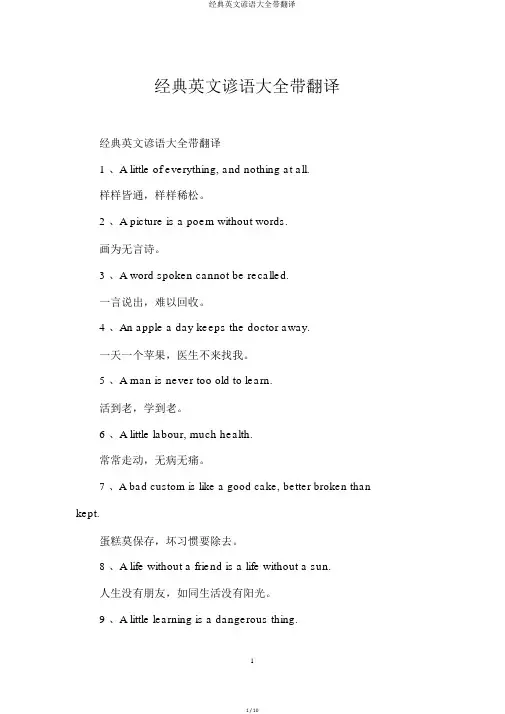
经典英文谚语大全带翻译经典英文谚语大全带翻译1 、A little of everything, and nothing at all.样样皆通,样样稀松。
2 、A picture is a poem without words.画为无言诗。
3 、A word spoken cannot be recalled.一言说出,难以回收。
4 、An apple a day keeps the doctor away.一天一个苹果,医生不来找我。
5 、A man is never too old to learn.活到老,学到老。
6 、A little labour, much health.常常走动,无病无痛。
7 、A bad custom is like a good cake, better broken than kept.蛋糕莫保存,坏习惯要除去。
8 、A life without a friend is a life without a sun.人生没有朋友,如同生活没有阳光。
9 、A little learning is a dangerous thing.浅学寡识是件危险的事。
10 、Act fairly by all men.视同一律。
11 、A man can die but once.人生只有一次死。
12 、A match will set fire to a large building.星星之火,能够燎原。
13 、A miss is as good as a mile.失之毫厘,差之千里。
14 、A bad beginning makes a bad ending.开头不好,结尾必糟。
15 、A man can not spin and reel at the same time.一心不可以二用。
16 、Adversity makes a man wise, not rich.困难和不幸不可以令人富裕,却能令人聪慧。
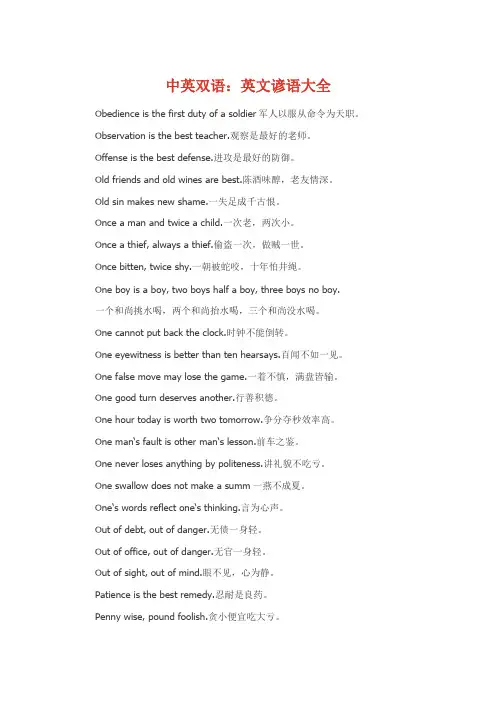
中英双语:英文谚语大全Obedience is the first duty of a soldier军人以服从命令为天职。
Observation is the best teacher.观察是最好的老师。
Offense is the best defense.进攻是最好的防御。
Old friends and old wines are best.陈酒味醇,老友情深。
Old sin makes new shame.一失足成千古恨。
Once a man and twice a child.一次老,两次小。
Once a thief, always a thief.偷盗一次,做贼一世。
Once bitten, twice shy.一朝被蛇咬,十年怕井绳。
One boy is a boy, two boys half a boy, three boys no boy.一个和尚挑水喝,两个和尚抬水喝,三个和尚没水喝。
One cannot put back the clock.时钟不能倒转。
One eyewitness is better than ten hearsays.百闻不如一见。
One false move may lose the game.一着不慎,满盘皆输。
One good turn deserves another.行善积德。
One hour today is worth two tomorrow.争分夺秒效率高。
One man‘s fault is other man‘s lesson.前车之鉴。
One never loses anything by politeness.讲礼貌不吃亏。
One swallow does not make a summ一燕不成夏。
One‘s words reflect one‘s thinking.言为心声。
Out of debt, out of danger.无债一身轻。
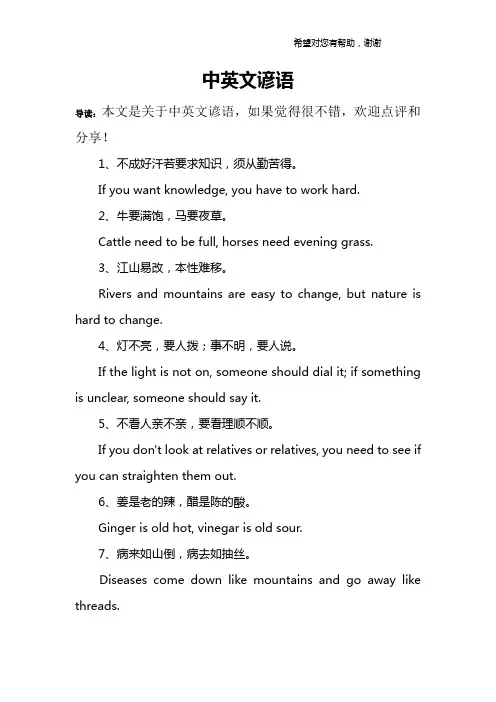
中英文谚语导读:本文是关于中英文谚语,如果觉得很不错,欢迎点评和分享!1、不成好汗若要求知识,须从勤苦得。
If you want knowledge, you have to work hard.2、牛要满饱,马要夜草。
Cattle need to be full, horses need evening grass.3、江山易改,本性难移。
Rivers and mountains are easy to change, but nature is hard to change.4、灯不亮,要人拨;事不明,要人说。
If the light is not on, someone should dial it; if something is unclear, someone should say it.5、不看人亲不亲,要看理顺不顺。
If you don't look at relatives or relatives, you need to see if you can straighten them out.6、姜是老的辣,醋是陈的酸。
Ginger is old hot, vinegar is old sour.7、病来如山倒,病去如抽丝。
Diseases come down like mountains and go away like threads.8、出门问路,入乡问俗。
Go out and ask the way, go into the country and ask the custom.9、天无边,智无限。
Heaven is boundless, wisdom is boundless.10、亏地不结籽,亏人不相交。
Loss of land does not bear seeds, loss of people do not intersect.11、好汉做事干到底,好马登程跑到头。

关于桥的谚语中英导读:本文是关于关于桥的谚语中英,如果觉得很不错,欢迎点评和分享!1、车到山前必有路,船到桥头自然直。
There must be a road before the car reaches the mountain, and the boat will be straight at the bridge.2、独木桥上跑马,冒险;危险。
Horse racing on a single wooden bridge is risky; dangerous.3、你走你的阳关道,我过我的独木桥。
You take your Yangguan Road and I cross my single-wooden bridge.4、独木桥上钉木板,故意让人过不去。
Nailing boards on a single wooden bridge deliberately makes it difficult for people to cross.5、路归路,桥归桥。
Road returns to road, bridge returns to bridge.6、双桥好走,独木难行。
Double bridges are easy to walk, but single trees are hard to walk.7、扁担插进桥眼里,担不起。
The pole was inserted into the bridge and could not afford it.8、独木桥上扛木头,难回头。
It is difficult to turn back when carrying wood on a single wooden bridge.9、过了河就拆桥。
If you cross the river, tear down the bridge.10、走的桥比你走的路多。
You walk more bridges than you do.11、白素贞哭断桥,想起旧情。

经典谚语中英版参考 romeisnotbuiltinaday.*冻三尺,非一日之寒。 sayingisonethinganddoinganother.言行不一。 seeingisbelieving.眼见为实。 seekthetruthfromfacts.实事求是。 sendawisemanonanerrand,andsaynothingtohim.智者当差,不用交代。 setathieftocatchathief.以贼捉贼。 shortaccountsmakelongfriends.好朋友勤算账。 somethingisbetterthannothing.聊胜于无。 soonlearnt,soonforgotten.学得快,忘得快。 soonripe,soonrotten.熟得快,烂得快。 speechissilver,silenceisgold.能言是银,沉默是金。 stillwatersrundeep.静水常深。 striketheironwhileitishot.趁热打铁。 victorybelongstothemostpersevering.坚持就是胜利。 takethingsastheye.既来之,则安之。 talkingmendsnoholes.空谈无补。 talkofthedevilandhewillappear.说曹*,曹*就到。 talltreescatchmuchwind.树大招风。 teachothersbyyourexample.躬亲示范。 thebestheartsarealwaysthebravest.无私者无畏。 thebestmanstumbles.伟人也有犯错时。 thecatshutsitseyeswhenstealing.掩耳盗铃。 thedangerpastandgodforgotten.过河拆桥。 thedarkesthourisjustbeforethedawn.黎明前的黑暗。 thedarkestplaceisunderthecandlestick.烛台底下最暗。 thedevilknowsmanythingsbecauseheisold.姜还是老的辣。 thedevilsometimesspeaksthetruth.魔鬼有时也会说真话。 thedieiscast.木已成舟。 theearlybirdcatchestheworm.早起的鸟儿有虫吃。 theendjustifiesthemeans.只要目的正当,可以不择手段。 theendmakesallequal.死亡面前,人人平等。 theeyeisbiggerthanthebelly.贪多嚼不烂。 thefarthestwayaboutisthenearestwayhome.抄近路反而绕远路。 thefinestdiamondmustbecut.玉不琢,不成器。 thefireisthetestofgold;adversity,ofstrongmen.烈火验真金,艰难磨意志。 thefirststepistheonlydifficulty.迈出第一步是最艰难的。 thefoxknewtoomuch,that'showhelosthistail.机关算尽太聪明,反误了卿卿*命。 thefoxpreysfarthestfromhome.兔子不吃窝边草。 thefroginthewellknowsnothingofthegreatocean.坐井观天。 thegrassisgreenerontheotherside.这山望着那山高。 thegreatesttalkersarealwaysleastdoers.语言的巨人总是行动的矮子。 thehigherup,thegreaterthefall.爬得高,摔得惨。 theleopardcannotchangeitsspots.本*难移。 themorenoble,themorehumble.人越高尚,越谦虚。 themorewit,thelesscourage.初生牛犊不怕虎。 theoutsiderseesthemostofthegame.旁观者清。 thepenismightierthanthesword.笔能杀人。 thepotcallsthekettleblack.五十步笑百步。 therearespotsinthesun.太阳也有黑点。 therearetwosidestoeveryquestion.问题皆有两面。 thereisaskeletoninthecupboard.家家有本难念的经。
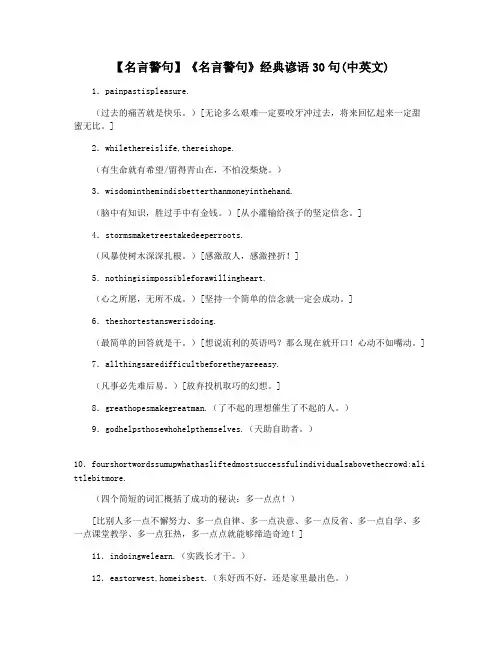
【名言警句】《名言警句》经典谚语30句(中英文)1.painpastispleasure.(过去的痛苦就是快乐。
)[无论多么艰难一定要咬牙冲过去,将来回忆起来一定甜蜜无比。
]2.whilethereislife,thereishope.(有生命就有希望/留得青山在,不怕没柴烧。
)3.wisdominthemindisbetterthanmoneyinthehand.(脑中有知识,胜过手中有金钱。
)[从小灌输给孩子的坚定信念。
]4.stormsmaketreestakedeeperroots.(风暴使树木深深扎根。
)[感激敌人,感激挫折!]5.nothingisimpossibleforawillingheart.(心之所愿,无所不成。
)[坚持一个简单的信念就一定会成功。
]6.theshortestanswerisdoing.(最简单的回答就是干。
)[想说流利的英语吗?那么现在就开口!心动不如嘴动。
]7.allthingsaredifficultbeforetheyareeasy.(凡事必先难后易。
)[放弃投机取巧的幻想。
]8.greathopesmakegreatman.(了不起的理想催生了不起的人。
)9.godhelpsthosewhohelpthemselves.(天助自助者。
)10.fourshortwordssumupwhathasliftedmostsuccessfulindividualsabovethecrowd:ali ttlebitmore.(四个简短的词汇概括了成功的秘诀:多一点点!)[比别人多一点不懈努力、多一点自律、多一点决意、多一点反省、多一点自学、多一点课堂教学、多一点狂热,多一点点就能够缔造奇迹!]11.indoingwelearn.(实践长才干。
)12.eastorwest,homeisbest.(东好西不好,还是家里最出色。
)13.twoheadsarebetterthanone.(三个臭皮匠,顶个诸葛亮。
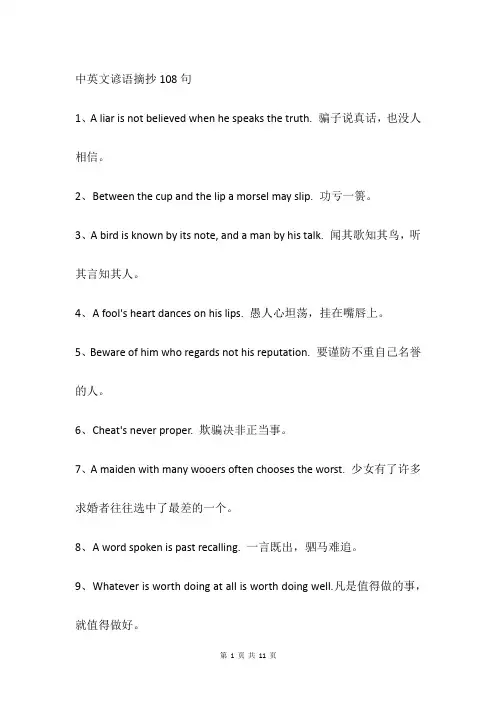
中英文谚语摘抄108句1、A liar is not believed when he speaks the truth. 骗子说真话,也没人相信。
2、Between the cup and the lip a morsel may slip. 功亏一篑。
3、A bird is known by its note, and a man by his talk. 闻其歌知其鸟,听其言知其人。
4、A fool's heart dances on his lips. 愚人心坦荡,挂在嘴唇上。
5、Beware of him who regards not his reputation. 要谨防不重自己名誉的人。
6、Cheat's never proper. 欺骗决非正当事。
7、A maiden with many wooers often chooses the worst. 少女有了许多求婚者往往选中了最差的一个。
8、A word spoken is past recalling. 一言既出,驷马难追。
9、Whatever is worth doing at all is worth doing well.凡是值得做的事,就值得做好。
10、All the treasures of the earth would not bring back one lost moment. 机会失去不再来,千贯万贯难赎回。
11、He knows most who speaks least.大智若愚。
12、All good things came to an end. 天下无不散之宴席。
13、No pains, no gains.没有付出就没有收获。
14、Avarice increases with wealth. 越富越贪。
15、Adversity successfully overcome is the highest glory. 成功地克服困难是最大的光荣。
带有中文的英文谚语100句中文谚语听多了,你知道英文谚语有哪些吗?谎言跑得再快,也追不上真理。
No matter how fast a lie runs, it cannot catch up with the truth.以下是小编精心收集整理的英文谚语,下面小编就和大家分享,来欣赏一下吧。
带有中文的英文谚语1、欲求生快活,须下死工夫。
If you want to live happily, you have to work hard.2、疮怕有名,病怕无名。
A sore is afraid of fame, but a disease of no name.3、贪得一时嘴,瘦得一身肉。
Greedy for a while, thin all over the body.4、不要看红灯花轿,要看老来收梢。
Don't look at the red light sedan chair, look at the old to collect the tip.5、打得一拳去,免得百拳来。
One punch to avoid a hundred.6、上床萝卜下床姜,常吃不用开药方。
Go to bed radish bed ginger, often eat no prescription.7、活动好比灵芝草,何苦去把仙方找。
Activity is like Ganoderma lucidum. Why go to find the immortal prescription.8、夏至冬风摇,麦子坐水牢。
The wind shakes on the summer solstice, and the wheat is ina water prison.9、悲伤忧愁,不如握紧拳头。
It's better to clench your fist when you are sad.10、人黄有病,天黄有雨。
关于动物的中英谚语范文一:动物是人类的朋友,人类可以从他们身上学到很多东西。
在中英文化中,有很多关于动物的谚语,今天我来介绍一下。
中文谚语:“狗咬吕洞宾,不识好人心。
”这句话的意思是说,有些狗因为主人的关系,会为坏人效力,不分好坏。
英文谚语中,“a dog's bark is worse than his bite”,意思是说狗狂吠不会伤害人。
这两句谚语体现了动物和人类的关系,有时候动物会因为条件而不得不去为坏人效力,而人类应该根据实际情况来判断一个人的好坏,而不是听信流言蜚语。
中文谚语:“鹤立鸡群。
”这句话非常形象,让人联想起在一群鸡中间,独自一只站立的优秀鹤。
这句话的意思是说,优秀的人或事物应该在人群中脱颖而出,展现出自己的特点。
英文谚语中,“like a fish out of water”,意思是说像鱼离开水一样不自在,用来形容人在不熟悉的环境中感到不适应。
这两句谚语都是希望每个人能够在适合自己的环境中发挥最大的潜力。
以上是我对于中英文中关于动物的谚语的介绍。
这些谚语虽然表达形式和内容各不相同,但是都是在告诉我们一些关于人类和动物之间的道理,让我们能够更好地理解和与动物相处。
要点分析:本文主要介绍了中英文中关于动物的谚语,通过对两种文化中的谚语进行对比和解读,揭示了人类和动物之间的关系和道理。
范文使用了形象生动的词语和例子,让读者更加容易理解和接受文章的观点。
同时,对不同谚语的解释也非常简洁明了,符合学生的阅读习惯。
范文二:动物是大自然中的重要组成部分,对于人类的生存和发展也起到了很大作用。
在中英文化中,有很多关于动物的谚语,让我们一起来看看吧!中文谚语:“萝卜青菜各有所爱。
”这句话的意思是说,每个人都有自己喜欢的东西,应该尊重别人的选择。
英文谚语中,“different strokes for different folks”,意思也是说每个人都有自己的喜好和爱好,应该互相尊重和包容。
摘要:谚语来源于生活,是一个民族语言和文化的高度浓缩和集中体现。它可以反映出一个国家的地理、历史、宗教等文化背景。研究一个国家的文化必然要研究其谚语。英汉谚语作为两种不同的语言瑰宝,由于其独特的文化而表现出明显的差异。因此,如何忠实地翻译谚语,把一种文化在另一种文化中再现出来,成了每一个译者不可推卸的责任。本文借助一些典型的例子,从起源、地理环境、风俗习惯、宗教信仰、历史文化等文化侧面入手,进行比较与分析,探讨了英语谚语和汉语谚语之间存在的差异。英汉谚语本身的特点以及其独特的文化背景使谚语的翻译比较困难。为了忠实、通顺地再现英语原谚,可以灵活运用四种译法。本文讨论了直译、意译、对等翻译、直译和意译相结合等翻译方法。 关键词:英汉谚语;文化;文化差异;翻译原则;翻译方法
Abstract: Proverbs, which derive from life are the condensation and embodiment of the language and culture of a nation. They can reflect geography, history, customs of a nation. So it is necessary to study a nation's proverbs when we try to study its culture. English and Chinese proverbs, being treasures of two different languages, see distinct differences resulted from cultural differences. This essay uses some typical examples to compare and analyze the differences between English and Chinese proverbs from the point of origin, geographical environment, customs, religious beliefs and historical culture, etc. Proverbs are difficult to translate because of their distinctive characteristics and their unique cultural backgrounds. In order to present an adequate translation of a proverb, we can use four translation methods flexibly: literal translation, free translation, equivalent translation and literal translation combined with free translation.
Key words: English and Chinese proverbs; culture; cultural differences; translation principles; translation methods
一、引言 谚语来源于生活,是一个民族语言和文化的高度浓缩和集中体现。英国哲学家弗朗西斯•培根说:“Genius wit and spirit of a nation are discovered by their proverbs.”(一个民族的天赋、智慧和精神都从他们的谚语中表现出来)。由于地理、历史、宗教信仰、生活习俗等方面的差异,英汉谚语承载着不同的民族文化特色和文化信息,它们与文化传统紧密相连,不可分割。[1]本文借助一些典型的例子,从起源、地理环境、风俗习惯、宗教信仰、历史典故等文化侧面入手,探讨了英汉谚语之间存在的文化差异。
由于英汉两种语言的文化背景差异,同样字面意义、形象意义的话可能具有完全不同的隐含意义。隐含意义才是说话人或作者所要表达的真正意义。英汉谚语之间的多方面差异可归为两类:一是形象意义的差异,一是隐含意义(包括褒贬义)的差异,而它们都是字面以外的意义,即文化差异的具体反映。[2]本文试图对英汉谚语的翻译作一些探索,提出了英语谚语翻译的具体原则及方法。
那么何为谚语呢?谚语是通俗简练、生动活泼的韵语或短句,它经常以口语的形式在人民中间广泛地沿用和流传,是人民群众表现实际生活经验或感受的一种“现成话”。[3]它是在民间流传的固定短语,用简单通俗的话反映出深刻的道理,是社会经验的总结。谚语作为民间文学形式的一种,具有诗的活泼,文的凝重,熟语的简洁。[4]
二、英汉谚语中所反映的文化差异 英国文化人类学家爱德华·泰勒在《原始文化》(1871)一书中,首次把文化作为一个概念提了出来,并表述为:“文化包括知识、信仰、艺术、道德、法律、风俗以及其作为社会上习得的能力与习惯。”[5]可见文化的覆盖面很广。谚语作为文化的一个组成部分,反映一个民族丰富多彩的文化现象。英汉谚语所反映的文化差异主要表现在以下几个方面:
(一)、起源差异 首先,英汉谚语都受到宗教思想的影响,但同中又有异。英谚受基督教的影响,反映了基督教的伦理道德和行为规范,如:No respecter of persons.(一视同仁);Man propose,God disposes.(谋事在人,成事在天)等,而汉谚则受到“儒”、“释”、“道”三教的影响,如:“养儿防老,积谷防饥”是儒家的思想;“不看僧面看佛面”是佛教的思想;“饶人不是痴,过后讨便宜”是道家的思想。
其次,英汉谚语的起源差别还是很大的。英谚中有大量出自典章及名人的作品中那些脍炙人口的词句,如:Never say die.(永远不要说“死定了”)出自英国小说狄更斯的《匹克威克外传》;而汉语文史学家们则认为汉谚相当一部分出自社会生活和生产实践,如:“远亲不如近邻”是对日常生活经验的总结。
除此之外,英谚中有许多来自拉丁文、法文等的外来语,有些甚至保留了原文,如:Cherchez la femme.(找出祸水)这是一句保留在英文中而以法语原文形式出现的谚语;而汉谚吸收了大量少数民族谚语,如:“劣行过四十年仍会败露”来自维吾尔族谚语;英谚中有许多来自寓言故事、神话传说,如:Love is blind.(爱情是盲目的)来自罗马神话,而汉谚中有大量农谚,如“宁在时前,不在时后”。[6]
(二)、地理环境的差异 谚语的产生与人们的生活密切相关。英国是一个四面环海的岛国,英吉利海峡是欧洲许多国家通向大西洋的唯—出口,也是世界上最繁忙的海上要道之一。因此英国历史上航海业曾一度领先于世界,这对英谚的形成有很大的影响。英语中就有许多与航海有关的谚语,如:to take the wind out of one’s sail(先发制人,抢占上风),to go with the stream/tide(随波逐流、顺应时势),to be all at sea(不知所措)。英国独特的地理环境使捕鱼业在其经济中占有相当重要的地位,这也为英语留下了大量与渔业有关的谚语,如: hook(land)one's fish(如愿以偿,用诡计得到想要的东西),have other fish to fry(有其他鱼要煎——有其他事要做),play a fish(让上钩的鱼不停地拖动钩线而致疲乏)等。而中国是一个内陆国家,千百年来以农业为主,人与土地有着不可分割的联系。因此汉语中就有许多与河流、土地和农业有关的谚语如:一帆风顺、过河拆桥、隔岸观火、拔苗助长、五谷丰登、瓜熟蒂落、春华秋实、根深蒂固、沧海桑田等。 [7]
(三)、习俗差异 英汉习俗差异是英汉文化差异的一个重要方面,最典型的莫过于在对狗的态度上。狗在汉语中是一种卑微的动物。汉语中与狗有关的词语大都含有贬意:狐朋狗党、狗急跳墙、狼心狗肺、狗腿子等。尽管近年来养庞物狗的人数大大增加,狗的地位似乎有所改变,但狗的贬义形象却深深地留在汉语言文化中。而在西方英语国家,狗被认为是人类最忠诚的朋友,所以西方人不吃狗肉。英语中有关狗的谚语除了一部分因受其他语言的影响而含有贬义外,大部分都有褒义。在英语谚语中,常以狗的形象来比喻人的行为,如:Every dog has his day.(人皆有出头日);Love me, love my dog.(爱屋及乌)等。与此相反,中国人十分喜爱猫,用猫比喻人,常有亲呢的成份,如:A cat has nine lives.(吉人自有天相),而在西方文化中,猫被用来比喻心地恶毒的女人,如:Cats hide their claws.(知人知面不知心)。[8]以狐狸为形象时,汉语强调狐狸尾巴露出破绽。如:The tail does often catch the fox.(常凭尾巴抓到狐狸),而英语强调狐狸花招多,难对付,如:When the fox preaches, then beware your geese.(遇上狐狸说教,当心鸡鹅被盗)。汉语认为失去马也无妨,说不定会带来好运,如:塞翁失马,焉知非福,而在英语里认为马不可失,如:Better lose the saddle than the horse.(宁可丢鞍,不可失马)。
(四)、宗教信仰方面 宗教信仰是人们精神活动的一个方面,对民族文化有一定的影响。与宗教信仰有关的谚语也大量地出现在英汉语言中。佛教传入中国已有一千多年的历史,人们相信有佛祖在左右着人世间的一切,因此汉语中有许多含“佛”、“庙”等的谚语,如“借花献佛”、“无事不登三宝殿”;[9]汉语反映道教思想的谚语有“福兮祸所伏,祸兮福所倚”、“乐极生悲”等。以孔子为祖师的儒家学派在思想意识上也占有重要位置,儒家思想在汉语谚语体系中留下了宝贵的财富,如:“严于律己,宽以待人”、“恭敬不如从命”;有关幸福的谚语如:“平安就是福”、“身在福中不知福”;还有像“天下兴亡,匹夫有责”、“谁言寸草心,报得三春晖”等提倡伦理教化和道德修养的谚语。在西方许多国家,特别是在英美,人们信奉基督教,在基督教中,上帝是唯一的、至高无上的神。因此在宗教生活及其活动中产生了许多带有浓厚的宗教色彩的英语谚语,如:Nature does nothing in vain.(造物主无所不能);God helps those who help themselves.(上帝帮助自助的人);[10]In the right church ,but in the wrong pew.(进对了教堂,但坐错了椅子)比喻“总的来说是对的,但细节上不对”。[11]